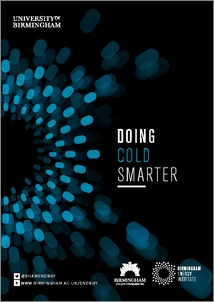Teverson, Robin and Peters, Toby and Freer, Martin and Radcliffe, Jonathan and Koh, Lenny and Benton, Tim and McLeod, Dinah and Uren, Sally and Elliot, Rob and Fryer, Peter and Braithwaite, Peter and Sanders, David and Hickman, Clive and Winser, Nick and Harper, Gavin and Strahan, David (2015) Doing cold smarter. Project Report. University of Birmingham.
![[img]](http://epapers.bham.ac.uk/2116/1.hassmallThumbnailVersion/Doing%2DCold%2DSmarter%2DReport.pdf)  Preview |
| PDF - Published Version
Doing%2DCold%2DSmarter%2DReport.pdf
8Mb |
Abstract
Cold has been much neglected in the energy debate. Governments are developing strategies and policies to green everything from electricity to transport to heat, but the energy and environmental impacts of cooling have so far been largely ignored. This is a serious oversight, since making things cold is energy intensive and can be highly polluting, and demand for cooling in all its forms is booming worldwide – especially in developing countries. According to one projection, by the end of this century global demand for air conditioning alone could consume the equivalent of half our worldwide electricity generation today – and most of the increase will come in developing markets. The ‘greening’ of cold is clearly an urgent global problem – but it may also offer Britain a massive business opportunity.
Cold may have been ignored but is vitally important to many aspects of modern life. An effective cold chain, for example, is essential for tackling problems such as food
waste, food security, water conservation and public health. Cooling is also critical for many less obvious but essential functions: data centres couldn’t operate without it, nor for example MRI scanners in medicine or superconductors in power electronics. Cooling also provides modern levels of comfort in hot countries – and can make the difference between some regions being habitable or not.
At the same time, vast amounts of cold are wasted – for instance during the regasification of LNG – which could in principle be recycled to satisfy some of this demand and start to reduce the environmental damage caused by cooling. Such a system-level approach – which starts by asking what energy services we need, and what is the least damaging way to provide them, rather than accepting existing practices as a fait accompli – has recently been coined the ‘Cold Economy’. It is clear the Cold Economy could unleash a wide range of innovative clean cold technologies and provide energy resilience, economic growth and environmental benefits, but there is an urgent need to develop a system-level analysis of this problem and the potential solutions to inform both industry and policymakers. The Birmingham Policy Commission: Doing Cold Smarter was convened to start this work.
| Type of Work: | Monograph (Project Report) |
|---|
| School/Faculty: | Colleges (2008 onwards) > College of Engineering & Physical Sciences |
|---|
| Number of Pages: | 84 |
|---|
| Department: | Chemical Engineering |
|---|
| Date: | 2015 |
|---|
| Subjects: | T Technology > T Technology (General) |
|---|
| Related URLs: | |
|---|
| Copyright Status: | This report is copyright of the authors and/or third parties. The intellectual property rights in respect of this work are as defined by The Copyright Designs and Patents Act 1988 or as modified by any successor legislation. Any use made of information contained in this poster must be in accordance with that legislation and must be properly acknowledged. |
|---|
| Copyright Holders: | University of Birmingham |
|---|
| ID Code: | 2116 |
|---|
Repository Staff Only: item control page



